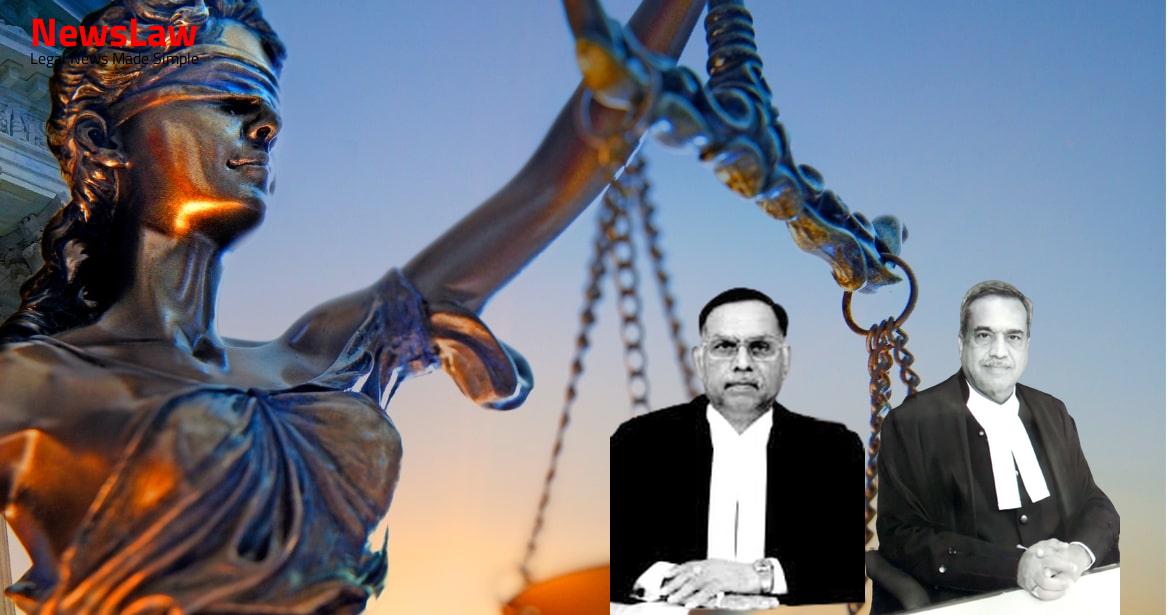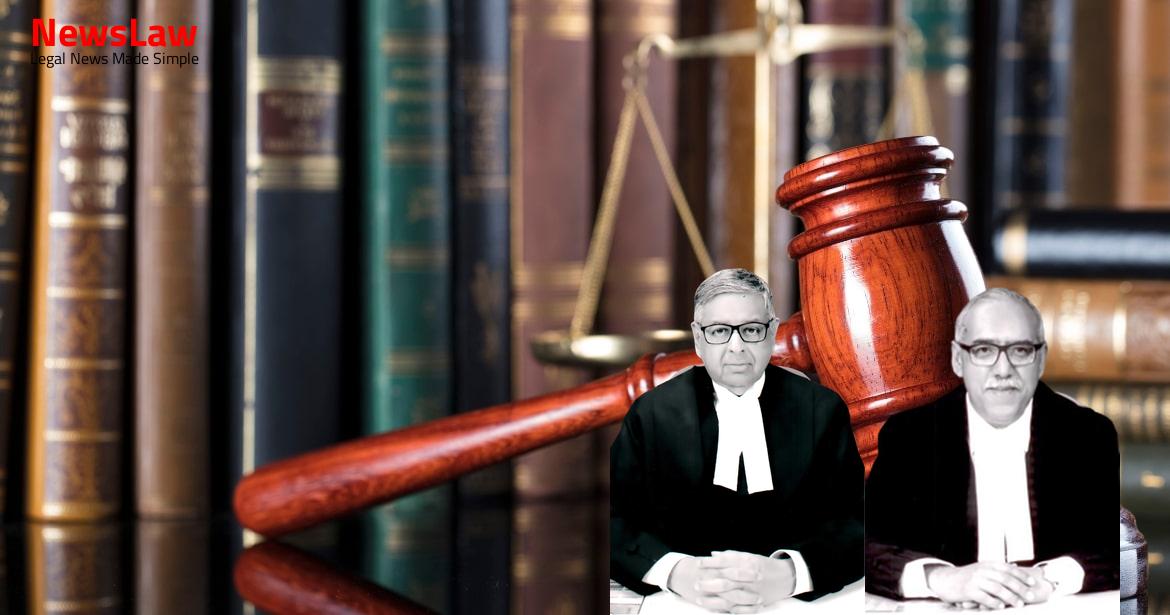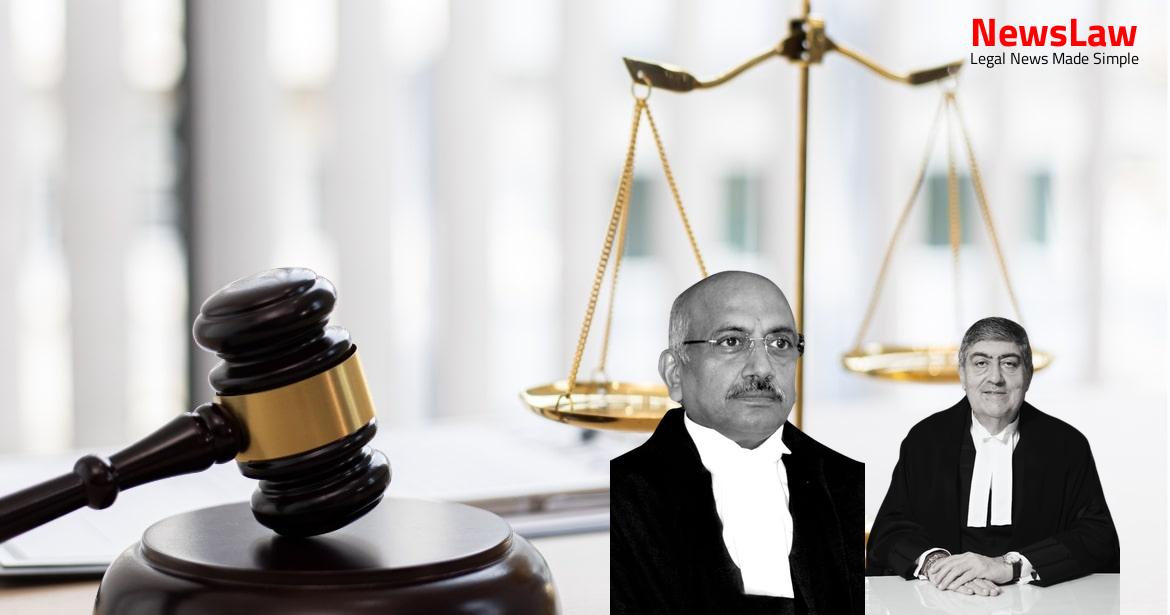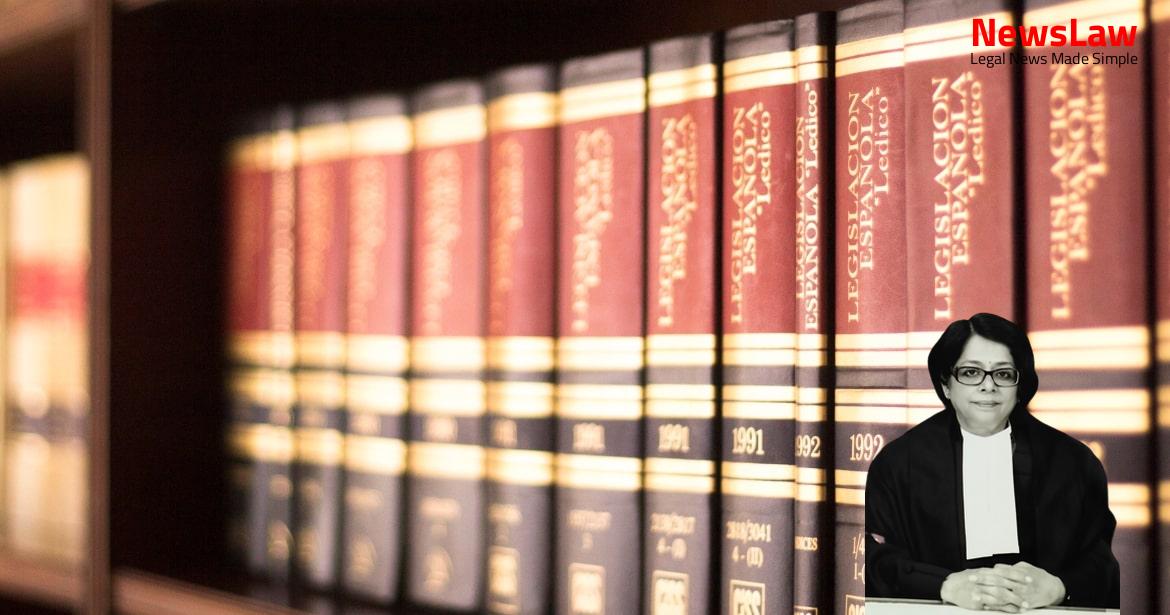Delve into the intricate world of legal analysis where the court’s examination of circumstantial evidence takes center stage. In a recent case review, the appellate court assessed the adequacy of evidence and the justification of reversing an acquittal. The importance of a complete chain of events in establishing guilt, and the nuances of interference with trial court decisions. Stay tuned for insights into the legal complexities surrounding circumstantial evidence and appellate reviews.
Facts
- The learned trial Court found that the prosecution withheld material information about sniffer dogs.
- Recoveries were made earlier and panchnama was prepared subsequently, which witnesses signed.
- Prosecution failed to establish the complete chain of events and relied on circumstantial evidence.
- High Court reversed the acquittal and convicted the accused under various sections of IPC.
- Accused were sentenced to life imprisonment for Section 302 read with 34, IPC, and other terms for different offences.
- Appellants were dissatisfied with the High Court judgement and have filed the present appeal.
- The investigating officer, PW18 conducted the investigation to prove the case against the accused.
- SHO/SI Narayan received a secret information about an abandoned vehicle in Chandigarh on 5.9.2010.
- The dead body of the deceased was found on 2.9.2010 near bypass Bihali Road, Chandigarh.
- Recovery of crates from Punjab and the reliance on disclosure statements, vehicle recovery, knife and rope recoveries, mobile recovery, and photographs from the jeep as evidence.
- Identification of the deceased’s body by the father of the deceased.
- The case was based on circumstantial evidence with no direct evidence presented before the trial court.
- Examination of 9 witnesses out of 19 listed in the chargesheet before the trial court.
- Arrest of both accused on 8.9.2010 and recording of their statements under Section 313, Cr.P.C.
- The accused persons were charged with various offences including murder under Sections 302, 392, 420, and 201 of the IPC.
- Registration of FIR by Head Constable Tara Chand and search for the accused using recovered photographs at Pandoh Bajaura Aut.
- Police response to information, recording of statements, preparation of Rukka and transmission to the police station, Bhunter.
- Recovery of a mobile phone, photographs, and vehicle documents from the recovered jeep by the IO.
Also Read: Transfer of Writ Petitions for Chartered Accountants’ Tax Audit Guidelines
Arguments
- The High Court has convicted the accused after re-appreciating the evidence on record
- The prosecution failed to complete the chain of events and there are material contradictions in the case
- Non-examination of independent witnesses at the time of recovery is addressed by the respondent State’s counsel
- Non-compliance of certain provisions is considered as defective investigation but does not vitiate the trial
- Recovery of weapon of offence, jeep, photographs, and stolen items is established by the prosecution
- The High Court found the accused guilty based on re-evaluation of evidence
- The High Court considered various circumstances pointing to the guilt of the accused
- The appellants’ counsel argues that the High Court exceeded its jurisdiction and convicted based on suspicion
- Specific criticisms are made regarding the recovery of knife and rope and other evidence
- Doubts are raised about the recovery of items such as mobile phone and photographs
- The conduct of police in the investigation is questioned, including lapses in involving jurisdictional police
- Failure to examine important witnesses and gather crucial information from recovered items is highlighted
- High Court entitled to re-appreciate evidence independently in appeal against order of acquittal
- High Court can interfere if Sessions Judge makes wrong assumption on material aspect
- High Court justified in interfering if order of acquittal is perverse or suffers from infirmities
- In present case, circumstantial evidence establishes guilt of the accused
- Order of acquittal by trial Court warranted interference by the High Court
Also Read: Analyzing Interference with Acquittal in Legal Conviction Case
Analysis
- The circumstances from which the conclusion of guilt is to be drawn should be fully established in cases relying on circumstantial evidence.
- The absence of motive in a case depending on circumstantial evidence weighs in favor of the accused.
- The appellate court should give weight to the trial court’s decision as it had the advantage of observing witness demeanor.
- An order of acquittal should not be lightly interfered with even if there is evidence pointing towards the accused.
- Illustrative circumstances justifying interference with a judgment of acquittal include erroneous view of law, contrary conclusions to evidence, and patently illegal approach.
- In cases of circumstantial evidence, the circumstances must be of a conclusive nature, excluding every possible alternative hypothesis.
- The High Court is justified in reversing an acquittal if the trial court’s approach to evidence is manifestly erroneous, leading to a duty to interfere.
- The High Court should consider credible evidence and not reach conclusions based on irrelevant material.
- In cases of circumstantial evidence, a complete chain of evidence leading to the accused’s guilt must be established.
- The presumption of innocence should be upheld, and interference in acquittal cases should only be done with compelling reasons.
- High Court not justified in reversing order of acquittal by trial Court.
- Impugned judgment and order by High Court cannot be sustained and should be quashed.
- Trial Court’s decision to record acquittal was justified due to prosecution’s failure to complete the entire chain of events.
Also Read: Judicial Review on Sentence and Compensation in Criminal Case
Decision
- The impugned judgment and order dated 20.09.2016 passed by the High Court of Himachal Pradesh in Criminal Appeal No 464 of 2012 is quashed and set aside.
- The judgment and order dated 15.06.2012 passed by the Additional Sessions Judge, Fast Track Court, Kullu, Himachal Pradesh in Sessions Trial No 05 of 2011 is restored.
- The accused-Appellants, Anwar Ali son of Gama Ali and Sharif Mohammad son of Sampat Mohammad, are to be set at liberty forthwith if not required in any other case.
- The present appeal succeeds based on the above reasons.
Case Title: ANWAR ALI Vs. THE STATE OF HIMACHAL PRADESH (2020 INSC 563)
Case Number: Crl.A. No.-001121-001121 / 2016



